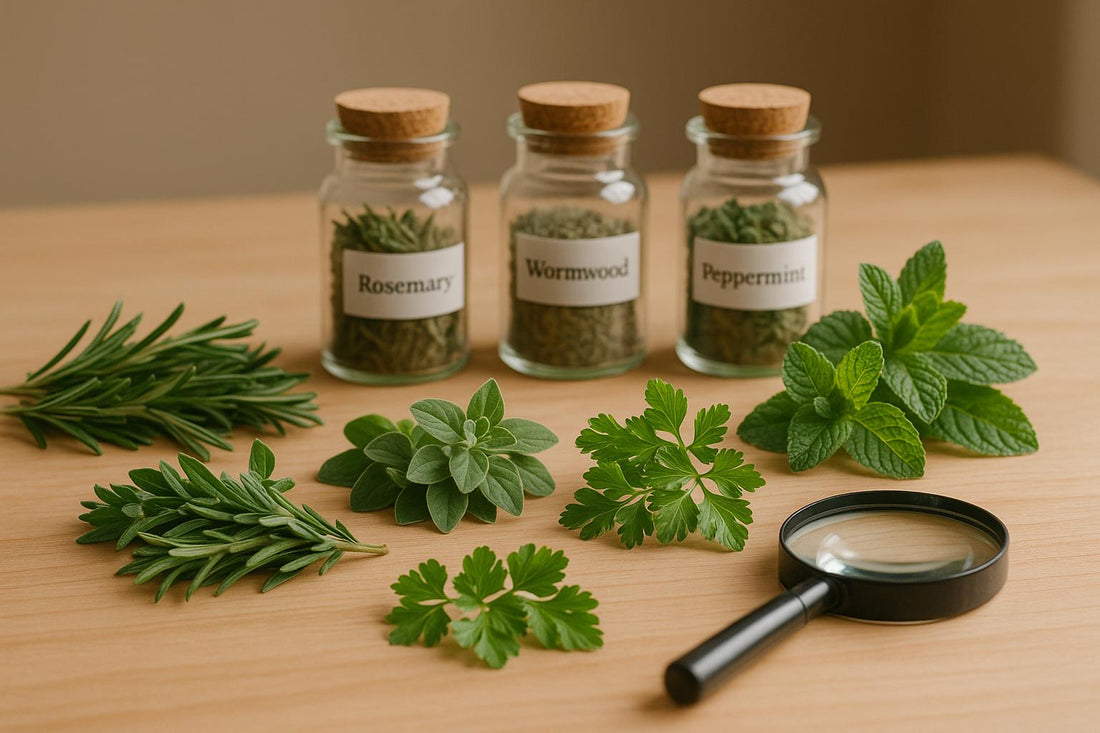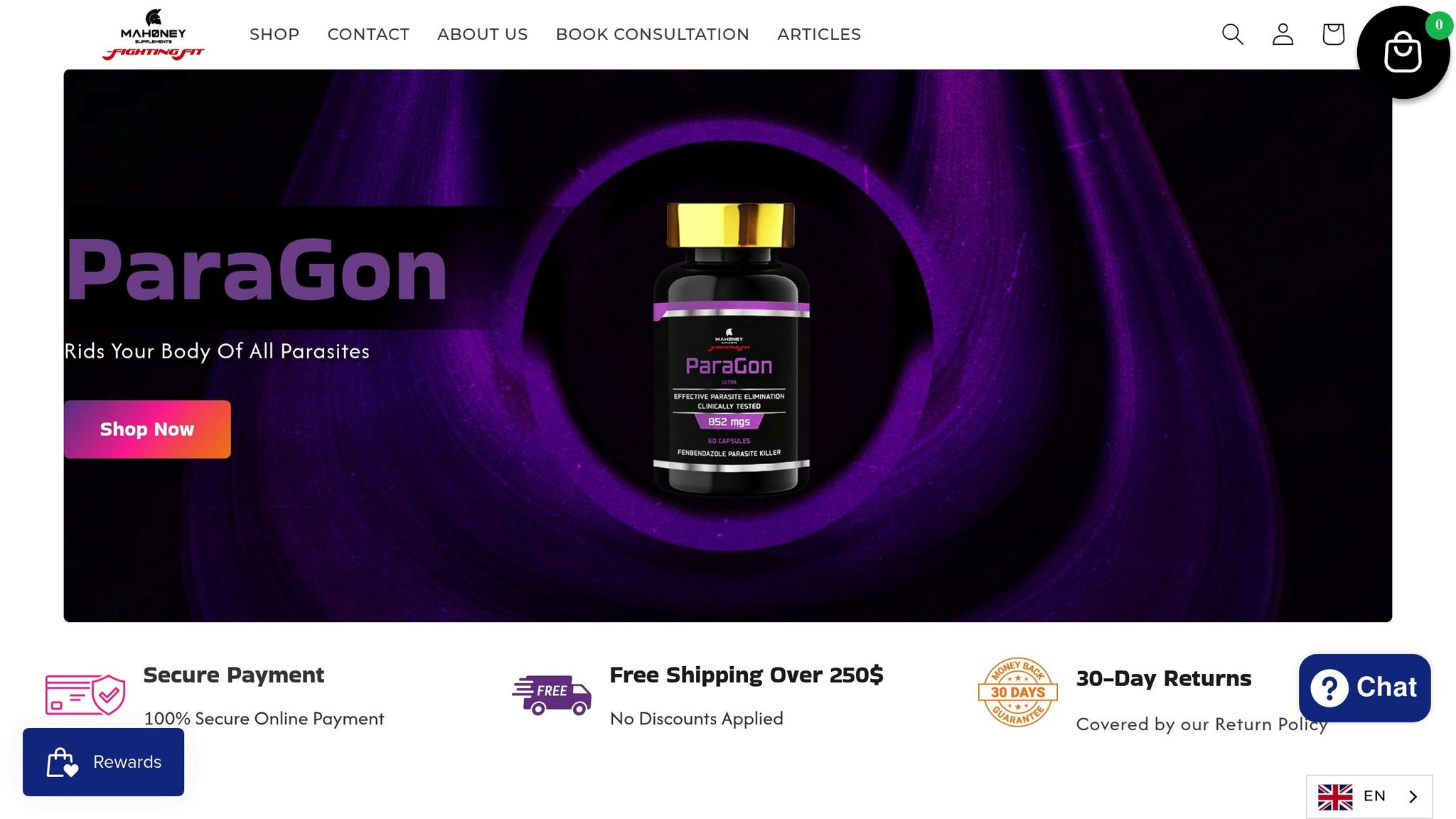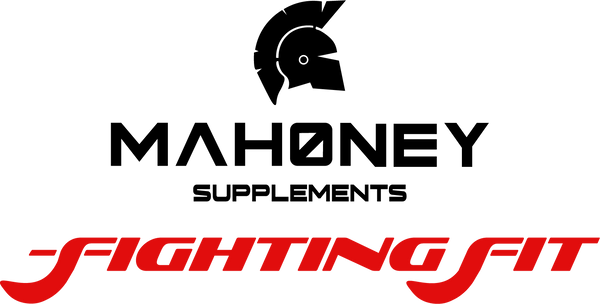
Research on Herb Quality for Parasite Cleansing
Share
Herbal remedies are increasingly popular for addressing parasitic infections, but not all products are created equal. Poor-quality herbs can lead to ineffective treatments or even health risks. Here's what you need to know:
- Global Impact: Over 3.5 billion people face parasitic infections annually, with 1.5 billion affected by soil-transmitted helminths.
- Demand for Herbs: Limited access to conventional treatments has driven interest in natural alternatives.
- Key Factors: Purity, potency, and proper processing determine an herb's effectiveness.
- Regulatory Gaps: The FDA doesn't regulate herbal supplements like drugs, leading to inconsistent quality.
Effective parasite cleansing relies on high-quality herbs verified for active compounds, free from contaminants like heavy metals and pesticides, and processed correctly. Brands like Mahoney Supplements address these concerns with rigorous testing and transparent sourcing. Their flagship product, ParaGon, combines research-backed herbs for reliable cleansing support.
Quick Tips for Choosing Quality Herbs:
- Look for third-party certifications (e.g., NSF, USP).
- Choose organic, non-GMO products to avoid harmful chemicals.
- Verify sourcing transparency and proper testing methods.
Using the right herbs can make a significant difference in cleansing success while ensuring safety.
Herbs and Supplements: Are They Safe? Do They Work? 2021
Scientific Factors That Determine Herb Quality
When it comes to effective parasite cleansing, understanding the science behind herb quality is essential. Three critical factors influence whether an herbal supplement delivers therapeutic results: accurate plant identification with proper active compound levels, thorough contaminant testing, and careful harvesting and processing. Let’s break down how each of these impacts the effectiveness of herbal supplements.
Plant Species Accuracy and Active Compound Levels
For herbs to work effectively against parasites, their species must be correctly identified, and their active compounds verified at therapeutic levels. Herbs like wormwood, black walnut hulls, cloves, and oregano oil owe their effectiveness to specific compounds such as α-Thujone, Juglone, Eugenol, thymol, carvacrol, and rosmarinic acid. These compounds must be present in the right concentrations to deliver results.
To ensure this, laboratories use advanced techniques like chromatography and spectroscopy. For example, methods such as gas chromatography, liquid chromatography, and high-performance liquid chromatography are employed to separate and analyze compounds. Spectroscopic techniques like mass spectrometry, infrared spectroscopy, and nuclear magnetic resonance confirm the molecular identity of these active ingredients. Extraction methods, such as using methanol for polar phytochemicals, also play a role in maintaining potency.
Research published in the Journal of Helminthology even found that wormwood can perform as well as leading anti-parasitic medications. This highlights the importance of precise plant identification and active compound verification in achieving therapeutic effectiveness.
Testing for Heavy Metals, Pesticides, and Contaminants
Safety is a top priority for herbal supplements, making rigorous contaminant testing essential. Heavy metals like lead, mercury, arsenic, and cadmium are common concerns. Techniques such as atomic absorption spectroscopy and ICP-MS are used to detect and ensure these metals stay within permissible levels set by regulatory authorities.
Pesticide residues are another issue. Certain pesticides, like organochlorine compounds, can cause serious neurological effects, including tremors and seizures. Testing methods like gas chromatography or liquid chromatography paired with mass spectrometry (GC-MS or LC-MS) are used to identify these residues. Beyond pesticides, labs also screen for adulterants or incorrect formulations, which could compromise both safety and effectiveness.
By addressing these risks, manufacturers can ensure that herbal supplements are not only safe but also maintain their intended therapeutic benefits.
Proper Harvesting and Processing Techniques
The timing and care taken during harvesting and processing can significantly impact the quality and potency of herbs. Harvesting herbs at their peak - when active compound levels are highest - and drying them under controlled conditions help preserve their effectiveness.
For aromatic herbs, harvesting earlier in the day can capture higher levels of volatile oils. The timing varies for different plant parts: flowers are best picked as they bloom, while roots and barks are usually harvested in spring or fall. Removing damaged or contaminated material during harvest further ensures the final product’s quality.
Studies indicate that resinous herbs like oregano, thyme, and rosemary retain their beneficial compounds better during drying compared to more delicate varieties. Proper storage also plays a role - dried herbs maintain their potency when kept in airtight containers, away from light and moisture.
These scientific practices form the foundation of high-quality herbal sourcing in the United States, ensuring reliable and effective parasite cleansing solutions.
How to Source High-Quality Herbs in the United States
When searching for reliable herbal supplements for parasite cleansing, it’s essential to focus on certifications, sourcing practices, and transparency. While the U.S. market offers plenty of options, not all products meet consistent quality standards. By understanding these key elements, you can make informed decisions and ensure the herbs you choose meet strict quality benchmarks. This is especially important for achieving the best results in parasite cleansing, as discussed earlier.
Third-Party Testing and Quality Certifications
Third-party testing plays a critical role in verifying the quality and safety of supplements. Certifications from organizations like NSF and USP are considered top-tier for ensuring that products contain exactly what’s listed on their labels - free from harmful contaminants. For example, NSF certification independently tests supplements to confirm they meet strict standards and don’t exceed acceptable contaminant levels. Additionally, NSF Certified for Sport® screens products for over 280 substances banned by major athletic organizations, making it a trusted choice for athletes.
Another important certification is cGMP (Current Good Manufacturing Practice), which ensures that products are manufactured and tested under rigorous protocols. These standards reduce the risk of contamination and help maintain consistent quality.
Choosing Organic and Non-GMO Herbs
The quality of ingredients is just as important as testing. Certifications like USDA Organic provide assurance that herbs are grown without pesticides, genetic engineering (GMOs), or sewage sludge. The USDA National Organic Program (NOP) is widely recognized as the leading standard for organic certification in the U.S.. Products labeled "Certified Organic" with the USDA seal typically meet organic standards for at least 95% of their ingredients. For parasite-cleansing herbs like wormwood, black walnut, and cloves, organic sourcing minimizes the risk of synthetic chemicals interfering with their natural properties.
Another label to look for is the Non-GMO Project Verified seal, which ensures that the herbs have not been genetically modified. This additional layer of assurance can give consumers peace of mind about the product’s quality.
It’s worth noting that some products may carry Proposition 65 warnings. According to the American Herbal Products Association (AHPA):
"The Prop 65 warnings may be alarming and even misleading, but they are well-intentioned, and the warnings on products present no actual risk."
Transparency and Traceability in Sourcing
Transparency has become a major priority for many American consumers. A 2019 survey by the Council for Responsible Nutrition (CRN) revealed that 77% of U.S. adults take dietary supplements, and a growing number want to know exactly where their products come from. In fact, 67% of consumers are willing to pay more for products with clear and transparent sourcing information. Labels with quality seals remain one of the most trusted indicators for consumers.
Some companies go the extra mile by offering detailed information about their supply chains, including where their herbs are grown, how they’re processed, and the testing methods used. This kind of traceability helps confirm a product’s quality and builds trust.
To verify the quality of supplements, consider these practical steps:
- Research the brand or manufacturer to understand their sourcing and quality standards.
- Purchase supplements in person to check expiration dates and certification seals.
- Review product labels and company websites to ensure compliance with FDA-recommended Good Manufacturing Practices (GMPs).
Jim Lassiter, COO of REJIMUS, highlights the importance of accountability in manufacturing:
"Brand owners must know specifications for their product's testing, stability and ingredients."
This level of responsibility should be evident in the information companies provide about their sourcing and quality control processes.
sbb-itb-9616115
Research-Backed Herbs for Parasite Cleansing
Scientific research highlights specific herbs with proven antiparasitic properties, making it easier to choose effective supplements. However, the quality of these herbs plays a critical role in their effectiveness. Below, we explore several well-studied herbs and their potential benefits based on research findings.
Wormwood and Pomegranate Peel
Wormwood (Artemisia absinthium) is one of the most extensively studied herbs for its antiparasitic properties. Its effectiveness is linked to compounds like artemisinin and essential oils. A 2020 study published in Animals by Mravčáková et al. tested wormwood's ability to combat Haemonchus contortus in sheep. The study found that aqueous extracts had strong ovicidal effects, with ED50 and ED99 values of 1.40 mg/mL and 3.76 mg/mL, respectively. Another study, published in 2024 in BMC Veterinary Research, demonstrated that administering wormwood powder at 90 mg/kg of body weight daily for 10 days showed effective antiprotozoal and anthelmintic activity against various parasites in swine.
Pomegranate peel is particularly effective against Giardia lamblia, thanks to its high levels of hydrolyzable tannins, ellagic acid, and gallic acid. A 2021 study in Antibiotics by El-Kady et al. showed that pomegranate peel extract significantly reduced both cysts and trophozoites in infected rats. Earlier research in 2017, published in the Asian Pacific Journal of Tropical Biomedicine, reported that pomegranate peel extract achieved a prevention rate of about 50% by day 10, reduced stool cyst counts by 75.6% by day 20, and reached a cure rate of approximately 97.4% by day 28 in experimental mice.
Propolis and Tansy
Propolis, a resinous substance made by bees, contains a complex mix of wax, resin, balsam, essential oils, pollen, and plant metabolites like amino acids, minerals, and vitamins. While it has shown antiparasitic properties, research specifically examining its effects on helminths is limited.
Tansy (Tanacetum vulgare) has a long history in traditional medicine for treating intestinal parasites, especially roundworms and threadworms. Its anthelmintic properties are mainly attributed to volatile oils, particularly thujone, which can make up to 81% of tansy essential oil. These compounds provide antimicrobial, acaricidal, and insecticidal effects. Studies have also shown its effectiveness against trematode flatworms responsible for schistosomiasis. However, high thujone levels can pose toxicity risks, especially for children and pregnant women, so internal use should only be undertaken with expert supervision. Tansy also contains other active compounds, including sesquiterpene lactones and flavonoids.
Other Effective Herbs: Garlic, Ginger, and More
Garlic (Allium sativum) is well-known for its antiparasitic properties, mainly due to sulfur-containing compounds like allicin and ajoene, which disrupt enzymes essential for parasite survival. A 2018 study in Medicines found that garlic extract had an IC50 of 0.95 ± 0.04 μg/mL against Trypanosoma brucei brucei and 2.89 ± 0.4 μg/mL against Leishmania tarentolae. It also demonstrated a Selectivity Index of 23, favoring antiparasitic activity over toxicity. Additional research shows allicin inhibits Entamoeba histolytica growth and can kill Candida albicans and Candida parapsilosis at minimal inhibitory concentrations of 5 μg/mL. Notably, garlic extract has proven more effective than onion extract in various tests.
Ginger (Zingiber officinale) also plays a role in parasite cleansing, thanks to active compounds like gingerdoine, gengerdiol, and gingerol. While research on ginger’s specific antiparasitic effects is still growing, studies suggest that combining garlic and ginger with conventional treatments can enhance overall effectiveness by disrupting vital redox compounds in parasites.
These findings emphasize that sourcing high-quality herbs is essential for reliable antiparasitic benefits.
Quality Standards: The Mahoney Supplements Approach

Mahoney Supplements takes herb quality seriously, especially when it comes to parasite cleansing. With more than a decade of experience in the supplement industry, the company has built its reputation on rigorous research and a commitment to transparency. Every product they create reflects this dedication, ensuring customers are informed and confident about what they’re using.
Kate Mahoney, the driving force behind the brand, highlights the importance of empowering consumers with knowledge:
"I'm really passionate about empowering people with supplement education."
For Mahoney Supplements, quality isn’t just a marketing buzzword - it’s a core principle. They understand that standards can vary widely in the industry, so they focus on maintaining the highest levels of quality rather than cutting corners. This philosophy is evident in their flagship product, ParaGon.
ParaGon: Complete Parasite Cleansing Formula

ParaGon is Mahoney Supplements' signature product, designed as a comprehensive solution for parasite cleansing. Priced at $104.95, this formula combines multiple herbs, each selected based on research for their antiparasitic properties. The company’s meticulous approach ensures that every ingredient is sourced and processed to maximize potency and effectiveness.
Each batch of ParaGon undergoes strict testing to confirm the concentration of active compounds, guaranteeing consistent results. This attention to detail addresses a common issue in the supplement industry - variability in product potency. By blending multiple herbs, ParaGon provides more robust support than single-ingredient alternatives, making it a standout option for those seeking a complete cleansing solution.
Support Products for Detox and Recovery
Parasite cleansing doesn’t stop with elimination - it’s a process that also requires detox and recovery support. Recognizing this, Mahoney Supplements offers complementary products like TUDCA & NAC ($92.00). This combination is specifically formulated to aid liver detox and manage die-off symptoms, a critical but often overlooked aspect of parasite cleansing.
TUDCA (Tauroursodeoxycholic acid) and NAC (N-Acetylcysteine) work together to support the liver in processing toxins released during cleansing. This thoughtful addition to their product line showcases Mahoney Supplements’ understanding of the entire cleansing journey, not just the elimination phase.
Another key product, their B17 supplement ($102.95), is designed to bolster the immune system during cleansing. By offering these targeted solutions, Mahoney Supplements provides a well-rounded system that eliminates the need for customers to piece together products from different sources.
Focus on Natural and Safe Solutions
Mahoney Supplements prioritizes safety and efficacy by adhering to strict ingredient sourcing and testing protocols. Every herb used is carefully harvested, processed, and stored to preserve its therapeutic properties. This ensures that their products meet the highest standards and deliver the benefits customers expect.
Kate Mahoney emphasizes simplicity in supplement selection, advising consumers to choose forms that are as close to whole foods as possible for better absorption. This philosophy guides the company’s formulations, ensuring their products are both effective and easy for the body to utilize.
Transparency is another cornerstone of Mahoney Supplements’ approach. The company actively engages with customers, welcoming questions and providing clear answers about their products and processes. As Team Mahoney states:
"We completely understand your concerns and fully support transparency. If you have any further questions or need clarification, feel free to reach out - we'll make sure to respond promptly this time!"
Conclusion: Key Points on Herb Quality for Parasite Cleansing
When it comes to parasite cleansing, the quality of herbs isn't just a detail - it’s the foundation of success. Scientific research highlights that the effectiveness of parasite-cleansing herbs hinges on their potency, purity, and proper processing.
The strength of herbs like black walnut and wormwood depends on maintaining therapeutic levels of active compounds such as juglone and thujone. These compounds are crucial for delivering the antimicrobial and anthelmintic effects needed to combat parasites. Proper extraction methods play a key role here, ensuring these bioactive components remain intact and bioavailable for the body to use effectively.
Contaminants like heavy metals and pesticides don’t just dilute the herbs’ potency - they can pose serious health risks as well. This makes it essential for consumers to look for third-party certifications, such as USP or NSF seals, to confirm the product’s purity and authenticity.
Brands like Mahoney Supplements set a strong example with their ParaGon product. By combining multiple research-backed herbs and using precise extraction techniques, they address many of the quality issues that can render other herbal remedies ineffective. This highlights the importance of careful sourcing and processing at every step to ensure a safe and effective cleanse.
FAQs
How can I make sure the herbs I use for parasite cleansing are safe and effective?
To make sure your herbs are both safe and effective for parasite cleansing, stick to buying from reliable suppliers that adhere to strict quality standards. Opt for herbs that are organically grown, free from pesticides and harmful chemicals. It's also important to verify that the supplier performs certification and testing to ensure the herbs are free of contaminants like heavy metals, pesticides, and harmful microbes.
Using high-quality herbs not only boosts their effectiveness but also protects your health during the cleansing process. Selecting natural, well-tested ingredients is essential for achieving the best outcomes.
What are the key active compounds in herbs like wormwood and black walnut that make them effective for parasite cleansing?
Herbs like wormwood and black walnut owe their parasite-cleansing abilities to their active compounds. Wormwood is packed with artemisinin and thujone, both recognized for their anti-parasitic effects. Meanwhile, black walnut contains juglone and tannins, which work by creating conditions that make it difficult for parasites to thrive.
To get the best results, it’s important to use high-quality, contaminant-free sources of these herbs. This ensures their potency and effectiveness in supporting parasite cleansing.
Why is it important to choose parasite cleansing supplements with third-party certifications, and which ones should you look for?
When it comes to parasite cleansing supplements, third-party certifications play a key role in guaranteeing their quality, safety, and effectiveness. These certifications confirm that the product contains exactly what it claims on the label and is free from harmful contaminants, offering peace of mind when you use it.
Keep an eye out for certifications from reputable organizations like NSF International, USP (United States Pharmacopeia), and ConsumerLab. Their seals show that the supplement has undergone independent testing to verify its purity and potency, meeting strict standards designed to support your health.
